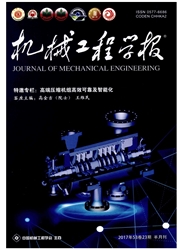

 中文摘要:
中文摘要:
压榨提取蔗汁是甘蔗制糖的常用方法。研究甘蔗压榨机理及其运行参数的工作通常以实践经验和试验为基础,这样会使试验成本大幅增加,而试验分析也受到很多不确定因素的影响。因此,采用有限元仿真方法进行甘蔗压榨过程的流固耦合分析。针对甘蔗压榨提汁中大变形、强摩擦和流固耦合的问题,对甘蔗纤维提出合理的简化与假设,将多孔介质力学理论应用于甘蔗压榨流固耦合分析,构建甘蔗纤维的本构关系;根据甘蔗压榨过程中的非线性力学现象,建立甘蔗压榨提汁的流固耦合有限元模型;通过流体渗流/应力耦合的有限元分析结果,说明仿真模型能表现出甘蔗纤维内部的力学现象,并能解释甘蔗压榨机理;在此基础上,分析压缩比、辊子线速度和喂料压力对压榨辊子的压力和转矩的影响,为优化压榨机运行参数提供参考依据;最后,给出了相应的结论。
 英文摘要:
英文摘要:
To extract cane juice by crushing is a common method of cane sugar manufacturing. The mechanism and operating parameters of sugarcane crushing is studied typically based on practical experience and experiment. However, the cost of test is high and test analysis is affected by many uncertainties. Therefore, the finite element simulation method is used to analyze the fluid-solid coupling of sugarcane crushing process. To study the complex process of large deformation, strong friction and fluid-solid coupling during sugarcane crushing, the reasonable simplification and hypothesis of sugarcane fiber is proposed. According to the nonlinear mechanical phenomenon of sugar cane crushing process, a fluid-solid coupling finite element model of sugarcane juice extraction is established. The results of seepage/stress coupling finite element analysis suggest that the simulation model can exhibit the internal mechanical phenomena of cane fiber, and can explain sugarcane crushing mechanism. The effects of the compression ratio, roller line speed and feeding pressure on roll pressure and roll torque are analyzed, which may provide a reference for optimizing the operating parameters of sugarcane mill. Finally, the corresponding conclusions are presented.
 同期刊论文项目
同期刊论文项目
 同项目期刊论文
同项目期刊论文
 期刊信息
期刊信息
